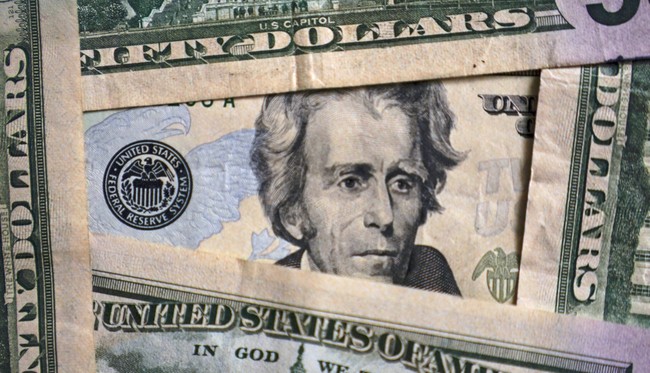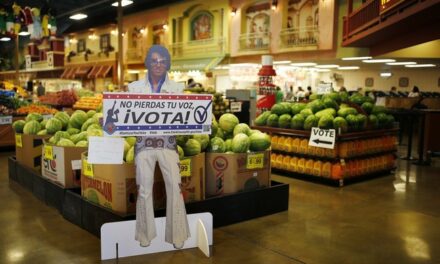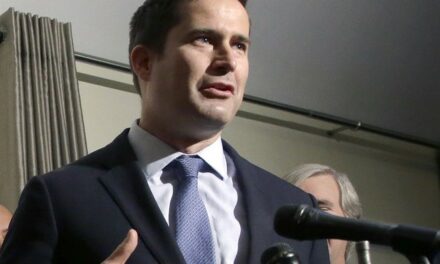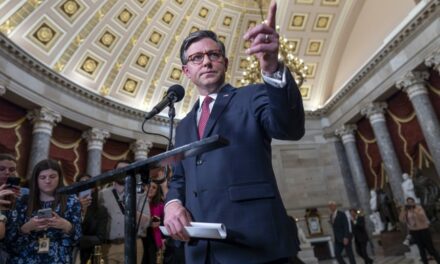We support our Publishers and Content Creators. You can view this story on their website by CLICKING HERE.

Joe Biden and Kamala Harris have tried to claim inflation was down and technically that’s true, but what the figures show is that the rate of increase is down. That’s good and better than the alternative but it doesn’t actually fix the underlying problem of rising costs which are felt by nearly everyone when they go to the grocery store. Unfortunately for Kamala Harris the inflation problem persists in the minds of many voters.
Advertisement
“This is the first presidential election in 50 years or so where the driving issue is what things actually cost at the grocery store,” said Mark Campbell, a Republican strategist. “James Carville famously said: ‘It’s the economy, stupid.’ But that’s not really the case. It’s how much things cost.”…
While strong economies historically have favored incumbent political parties, a wave of populism — driven in part by discontent over surging prices — has punished incumbents in a number of nations, including Britain, South Africa and India.
In the United States, the downbeat perception of the economy has defined this election cycle: A majority of voters say the economy is a top concern, with 52 percent saying it is an “extremely important” factor in how they will vote — the highest level since the throes of the Great Recession, Gallup polls show.
Democrats knew this was a problem and came up with an alternative boogeyman they could present to the public other than the current administration. Instead of accepting that people were hurt by inflation, the alternative was to blame corporations for what became known as greedflation. The idea was popular enough that the word wound up being added to the dictionary this year.
Advertisement
Earlier this year, dictionary.com added the word “greedflation” to its list of actual words, which it defines as, “a rise in prices, rents, or the like, that is not due to market pressure or any other factor organic to the economy, but is caused by corporate executives or boards of directors, property owners, etc., solely to increase profits that are already healthy or excessive.”
A nonprofit called Groundwork Collaborative, with the mission of driving “policy change with credibility, expertise, and impact,” claimed credit for helping push “greedflation” into the common political parlance. They might be right. The group authored a widely cited study that purports to show how outsized corporate profits have caused rising prices.
But the study that pushed the idea of greedflation turns out to be full of holes. For one thing, the authors seem to have misunderstood a metric they used to make their point.
This study, which the Cato Institute’s Ryan Bourne has also written about critically, was co-authored by Liz Pancotti and Groundwork Collaborative’s Executive Director Lindsay Owens. They found that “prices for consumers have risen by 3.4 percent over the past year” while “input costs for producers have risen by just 1 percent.” This is supposedly evidence that corporations are “exploiting their pricing power” to drive up the cost of goods and services…
Owens and Pancotti misrepresented the data by cherry-picking one year, but it doesn’t matter either way for the point that they were trying to make. That’s because they also misunderstood the meaning of the Producer Price Index. It measures the prices at which producers sell their products to wholesalers; it doesn’t measure input costs, or what companies spend making their products. It’s a price index, not a cost index. So comparing it to the Consumer Price Index tells us nothing about corporate profit or “greedflation.”
Advertisement
But again, it didn’t really matter whether it was true, it only mattered that Harris and Biden could lay the blame on someone else. In this case that meant blaming the big grocery chains and threatening to pass laws to prevent price “gauging.”
Anyway, it was too late for Harris to change the narrative about the economy and greedflation was an idea that didn’t hold up to much scrutiny. This week, Reason put out a good video about the topic.

 Conservative
Conservative  Search
Search Trending
Trending Current News
Current News 







